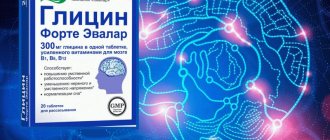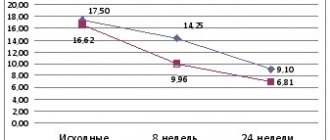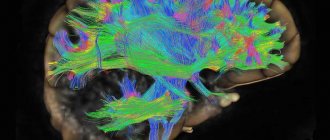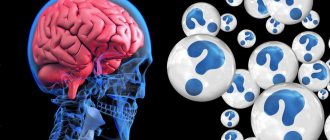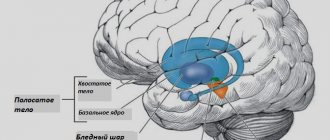Causes of forgetfulness
All the reasons that provoke the occurrence of memory lapses can be divided into two categories, namely physiological and psychological reasons.
Physiological factors include: injuries, chronic diseases (for example, cardiovascular diseases), various disorders in the brain and disorders of the functioning of the nervous system. Also, this disorder arises as a result of regular lack of sleep, a sedentary lifestyle, improper metabolism, non-compliance with diet, and disruptions in the blood circulation system.
Psychological factors include: daily stressful situations, constant fatigue, lack of attention, expansive states (lethargy or agitation), excessive thoughtfulness. As a result of these factors, the individual switches to mechanical performance of certain essential operations, and they are not remembered at all.
Short-term memory loss can be a manifestation of many different disorders. And the cause of its occurrence is depressive conditions, infectious diseases, various injuries, side effects from the abuse of alcoholic beverages or drugs, taking certain medications, and dyslexia.
Also, the interaction of certain medications can cause short-term memory loss, for example, the simultaneous use of Imipramine and Baclofen.
In addition, short-term memory loss can occur due to neurodegenerative diseases, cerebrovascular disorders, skull injuries, normal pressure hydrocephalus, sleep disorders, thyroid pathologies, mental disorders, Wilson's disease.
Short-term amnesia, in turn, can be triggered by a hormonal disorder. Some female representatives of the population may experience cases of short-term amnesia during menopause.
Partial memory loss is a so-called malfunction in the functioning of the brain, characterized by a disorder of spatio-temporal indicators, the integrity of memories and their sequence.
The most common factor provoking partial amnesia is considered to be a dissociative fugue or the state of an individual after a change of residence. For example, partial amnesia may occur as a result of an individual moving to another city. At the same time, events that range from a couple of minutes to several years ago may disappear from memory.
The second cause of this form is considered to be severe mental trauma or shock. The subject loses some biographical information from memory, which triggers negative memories.
In addition, partial amnesia can occur due to the effect of hypnosis on an individual. An individual may not remember what happened to him during hypnotic influence.
Senile memory loss is observed accordingly in older individuals. However, it cannot be considered solely a consequence of age-related changes. More often, senile amnesia occurs due to the lifestyle of individuals. Also, the causes of this form of the disease can be: metabolic disorders, infectious diseases, traumatic brain injuries, poisoning and various brain pathologies.
Memory loss in young people can occur due to chronic lack of sleep or sleep disturbances, lack of vitamin B12 and regular exposure to stress. Young people can also experience memory loss after stress. Often, as a result of suffering a severe emotional shock, young individuals can completely forget all data about themselves.
It should be immediately noted that modern man is most susceptible to the disease of forgetfulness, since his brain is daily exposed to a large amount of various information coming from radio, television and especially the Internet. In this state, the human brain can independently block most of the unnecessary information so as not to become completely overloaded.
The following are the main reasons why a person’s memory is impaired and he claims that he forgets words during a conversation, especially if he carefully tries to remember everything at the right moment:
- Lack of sleep.
- Head injuries.
- Various diseases of the central nervous system and mental disorders.
- Vascular atherosclerosis.
- Diabetes.
- Alzheimer's disease.
- Thyroid diseases.
- Osteochondrosis.
- Depression.
- Lack of nutrients.
Let's look at each of these causes of poor memory in more detail.
Load Type
Today, there are washing machines on the market with two types of loading: vertical and front-loading.
A top-loading washing machine loads laundry into the drum from above, through the top side of the machine, in which the door is made or which opens completely. The control panel in such models is located on the top panel. All semi-automatic machines belong to this type.
https://www.youtube.com/watch?v=IHW_26j5VHg
Top-loading washing machine models have their advantages:
- It’s more convenient to load things and laundry detergents into them; there’s no need to bend or squat;
- installation of such models is possible in those places where it is not possible to install a front-facing camera, or rather open its hatch;
- There are models in which you can add laundry during the washing process.
The main reason for the popularity of front-loading washing machines is the release of the top side of the machine. Firstly, such models are suitable for installation under the same countertop with other furniture (kitchen set or sink/bath cabinet). And secondly, the surface itself can be used as an additional countertop: place containers with detergents or jars of cosmetics.
Users noted no dependence of the reliability of the washing machine or the quality of washing on the type of load. This parameter should be considered depending on where you can put the machine and how it will be more convenient for you to use it.
Prognosis and prevention
Considering the different severity of the primary disease in each patient, as well as the organic and psychogenic causes of hypermnesia, there can be no clear prognosis for recovery.
With minor mental disorders, complete recovery occurs much more often, in contrast to cases of brain damage by tumor formations, hydrocephalus and irreversible degenerative processes in the cerebral cortex.
You can avoid the possibility of hypermnesia whenever possible. For this purpose, taking narcotic drugs, alcohol intoxication, accidental or intentional overdoses of psychotropic drugs is unacceptable.
At the first alarming symptoms of a mental disorder, you should immediately contact a psychotherapist for help. And periodic brain examinations using MRI will help detect the problem as early as possible.
The phenomenon of hypermnesia has nothing to do with brilliant supermemory. Due to the enormous psychological burden, this condition is extremely painful and requires immediate treatment.
Dimensions
The size of the tank and drum directly depends on how much laundry it is designed to load. The minimum loading volume of the drum is designed for 3 kg of dry laundry. The maximum load of the latest models can reach up to 12 kg of laundry.
The larger the load, the more liters of water will be needed during washing. And the load will increase with the increase in the amount of laundry loaded. The diameter and radius of the hole on the side for loading laundry also depends on the volume of loaded laundry. Therefore, when choosing machines with heavy loads, you should pay attention to the reliability of parts and build quality. The best enterprises for assembling household appliances are located in Europe. Cars assembled in Korea or Japan are also well-built.
Impaired short-term memory
The problem of lack of sleep (see Causes of Insomnia) is very common today, especially among working people who may work at night. Also, when regularly watching TV or spending time on the Internet until late in the evening, the human brain does not get enough time to rest and suffers from memory impairment.
In addition, you should know that disturbed sleep can negatively reflect on a person’s psycho-emotional background, making him absent-minded and disrupting his reaction speed.
We invite you to familiarize yourself with Diseases of the Amazon lily
In this state, there is no need to rush to take pills, because solving the problem is simple - you just need to normalize your sleep, sleep at least eight hours a day. This will fully compensate for the time spent on rest, because then the brain will work much better.
Memory functionally and anatomically consists of short-term and long-term components. Short-term memory has a relatively small volume and is designed to retain semantic images of received information for from a few seconds to three days. During this period, information is processed and transferred to long-term memory, which has an almost unlimited capacity.
Short-term memory is the most vulnerable component of the memory system. It plays a key role in remembering. When it is weakened, the ability to record current events is reduced. Such patients develop forgetfulness, making it difficult to perform even simple everyday tasks. The ability to learn is also greatly reduced.
Temporary amnesia due to severe alcohol intoxication, traumatic brain injury, and other conditions leading to an eclipse of consciousness is also caused by a transient complete shutdown of short-term memory. In this case, events that do not have time to move into long-term memory disappear.
Complete loss of short-term memory (fixation amnesia) is observed in Korsakoff syndrome. Characteristic of dementia and advanced stages of alcoholism. Such patients completely lose the ability to remember current events and are therefore completely socially maladjusted. At the same time, events preceding the onset of fixation amnesia are stored in memory.
Manufacturers of models with collapsible tanks
The non-dismountable design is being used more and more often by manufacturers; if a dozen years ago a solid drum was a curiosity, in a modern washing machine it is more difficult to find a collapsible one. Manufacturers believe that a one-piece design is more reliable and cheaper to manufacture, and it is not practical to repair bearings - it is easier to replace the entire assembly.
List of manufacturers who prefer one-piece construction:
- Indesit, Ariston, Candy, Zanussi, ARDO (Italy);
- Beko (Türkiye);
- Whirlpool (USA).
Brand of cars with collapsible tank:
- Samsung, LG (Korea);
- Atlant (Belarus);
- AEG, Siemens (Germany);
- Electrolux (Sweden);
- Gorenje (Slovenia);
- Haier (China).
The German brand Bosch produces both types of washing units: solid ones are marked with the index WAA, collapsible ones - WAE.
As a rule, all old washing machines have a collapsible tank. By “old” we mean units older than 5–10 years. In modern models, this advantage is becoming less and less common.
The Belarusian company ATLANT holds its position. All of their samples, regardless of the materials from which the insides of the automatic machine are made, can be successfully disassembled. The Korean manufacturer LG supports them in this, but with a small caveat: although some models can be unscrewed, the bearings cannot be changed, as mentioned above. However, this is offset by the low cost of replacing the entire rear forecastle at a certified service center.
We suggest you read: How to wash toys in a washing machine, instructions and rules
Many companies have successfully switched to monolithic plastic containers, but also continue to produce brands with collapsible metal containers. These include:
- Samsung;
- Electrolux;
- AEG;
- Gorenje;
- Siemens.
In Bosch washing machines, there are two types of tank, regardless of the material of manufacture. In the WAA series it is not dismantled, while the WAE series provides such an opportunity. The Bosch WLG series machine has both types of models.
The list of brands whose tank is no longer disassembled looks like this:
- Indesit;
- Ariston;
- Candy;
- Whirlpool;
- ARDO;
- Beko.
Symptoms
The main symptom of amnesia is, of course, memory loss itself. A person can forget any things for a short period of time or forever. Even a situation where you can’t find your car keys is a sign of amnesia. There are also a number of other symptoms that can be associated with the causes of this disease. Almost all of them can occur, but often only a few of them appear, and sometimes the person simply becomes very forgetful.
Possible symptoms:
- Confusion. The person has problems with perception, cannot remember important information, and his behavior becomes strange.
- Paramnesia and confabulation appear. This means a distortion of facts and any memories in a person’s head, as well as the presence in memory of false events that never happened. Often accompanied by hallucinations.
- Speech problems. The person speaks slurredly, utters meaningless phrases, or cannot say a word at all.
- Low concentration, impaired brain activity. It is difficult for the patient to concentrate on one specific task and do usual activities.
- Headache. The pain can be periodic, but sometimes does not stop for a very long period. Their strength depends on the root cause.
- Dizziness. The head may feel slightly dizzy, which many people don’t pay attention to at first.
- Lack of orientation in space. The patient does not understand where he is and does not recognize familiar places. At the same time, he completely loses orientation in space.
- Coordination problems. It is difficult for a person to control his body, he often makes mistakes in movements.
- Shiver. A person sometimes suddenly begins to tremble. There are no obvious reasons for trembling.
- Fatigue. Feelings of extreme fatigue can appear at any time of the day or last for several days.
- Bad mood. The patient is not in the mood for positive communication; he has a complete lack of interest in what is happening around him.
All these symptoms are signs of either the root cause of memory loss, i.e. underlying disease, or progressive amnesia, which can lead to serious problems. Both cases require medical intervention, because can cause a person to be intellectually disabled, completely lose their memory, and experience serious complications.
Rotational speed
If you need to get your laundry out of the machine almost dry, then you need to choose washing machine models with spin class A. Models of washing machines with a spin class lower than C are not easy to find in the store, although in practice it will only take a little more time to dry the clothes.
For different types of fabrics it is recommended to use different spin speeds:
- It is better to spin thin and delicate laundry at 400–600 rpm;
- 800–900 rpm is suitable for loose cotton and synthetics;
- at 1000 you can squeeze out jeans well;
- the higher speed, if available, is for items such as terry robes and towels. At a speed of 1000–1600 rpm, the spin difference can only be felt on coarse fabrics.
It should be remembered that the higher the spin speed during each wash, the faster the laundry wears out and deteriorates. Therefore, it is better to choose a washing machine with the ability to set the spin cycle on different programs.
The rotation speed in modern models can reach up to 1400 rpm.
But at the same time, when spinning at high speeds, the laundry may receive mechanical damage, since sections of the fabric that fall into the holes on the drum can be damaged by coming into contact with them.
Therefore, when choosing a high-speed machine, it is important to pay attention to a drum made using modern technology that helps prevent damage. It is necessary to check that the more convex its inner surface is, the less the laundry will be subject to wear during washing.
Why does partial and complete amnesia occur?
Today in medicine, the following types of amnesia and their features are distinguished, namely anterograde, which is associated with the loss of the skill of remembering faces or events, retrograde, characterized by the absence of memories preceding the onset of the disease, traumatic, occurring after a blow, a fall, that is, as a result of injury, fixation, dissociative, resulting from mental trauma, Korsakoff's syndrome, localized, selective, confabulation.
Korsakoff's syndrome occurs as a consequence of vitamin B1 deficiency due to poor diet, excessive alcohol consumption, often after head injuries. Its main symptom is the inability to remember events occurring now while retaining memory for past events.
Localized amnesia can occur with a disorder of one or more memory modalities. It is associated with focal lesions of certain brain regions and is combined with loss of memory for words, loss of motor skills and the ability to recognize objects.
Selective amnesia is the loss of memories for certain events that are mental and stressful.
Dissociative amnesia is characterized by severe consequences caused by the complete loss of the patient's memories of himself and his own biography.
False memories or confabulations are often the most prominent early symptoms. They are associated with impaired memory for nearby events. With the chronic course of the disease, confabulations are less noticeable. A disoriented patient replaces facts of reality that he is unable to remember with imagined or actually happened, but under different circumstances.
We invite you to familiarize yourself with the Lounge area
In addition to the described types of amnesia, it is necessary to highlight such types of amnesia and their features as transient, global and psychogenic amnesia.
The first type is characterized by the sudden onset of deep confusion associated with memory impairment. This state can last from thirty minutes to twelve hours, sometimes more. During the attack, complete disorientation is noted (only orientation in one’s own personality is preserved), which is accompanied by retrograde amnesia, extending to events that occurred in the last years of life.
As you recover, retrograde amnesia gradually regresses. In most cases, complete recovery is observed. The cause of the described condition is considered to be transient ischemia, provoking a bilateral dysfunction of the hippocampus or posteromedial thalamus. In relatively young people, the cause may be migraine.
Psychogenic amnesia is characterized by specific features and can affect memories of both recent and distant events. It tends to increase during emotional crises. Memories of distant events are impaired as well as memory of recent events. Often, patients may experience disturbances in self-identification.
There are various classifications of memory pathologies. Based on the criterion of development speed, acute and progressive amnesia are distinguished.
An abrupt loss is caused by a traumatic event: a bruise, a blow. The illness is temporary.
The progressive form occurs due to changes in the functioning of certain brain structures due to age-related changes.
According to the criterion of duration, amnesia is divided into short-term and long-term. Short-term is characterized by the ability to restore lost memories. The patient knows what happened before the event, but cannot describe the traumatic moment.
The reasons for this are psychological and physiological injuries, extreme emotional stress, and head injuries. Events are gradually being restored, starting from the earliest ones. Temporary memory loss occurs due to the effects of psychoactive substances, alcohol, and tranquilizers on brain cells.
Amnesia is often included in a number of symptoms of other diseases:
- senile dementia of the Alzheimer's type;
- malignant neoplasms in the brain;
- shaking palsy;
- epilepsy;
- HIV infections;
- meningitis;
- long-term depression.
Long-term loss of the ability to remember is characteristic of a post-traumatic state and senile changes.
The death of brain cells under the influence of toxic substances and medications leads to irreversible consequences, loss of functions of remembering, storing, and reproducing information. Cells die in post-stroke patients with motor amnesia.
According to the criterion of prevalence, amnesia is divided into partial, when fragments of life are lost, and complete, when the patient is disoriented and cannot determine the time, location, or name his data.
All memories for a certain period are erased. The inability to reproduce information is characteristic of dissociative fugue - a severe disorder that occurs after experiencing an extreme situation.
Partial amnesia occurs in epilepsy, when the patient does not directly remember the seizure. One or more modalities are lost (forgetting skills, loss of the ability to recognize people, objects) due to damage to brain cells, the influence of stress, personality traits (hysterical amnesia).
Global amnesia is characterized by confusion of consciousness and develops due to transient ischemia, migraine, and atherosclerosis.
Memory loss in senile age is a consequence of atrophic changes in the cerebral cortex.
Amnesia in the elderly is a symptom of presenile dementia, Alzheimer's disease, toxic encephalopathy, and senile dementia. Memory deteriorates gradually and is an irreversible process.
Transient global amnesia combines retrograde and anterograde forms, begins suddenly, lasts about a day. It affects people aged 50 to 70 years. It is assumed that this form is the result of ischemia, migraine, circulatory disorders, convulsive syndrome, and severe psychological stress.
In people of working age, memory is lost due to stroke, vascular diseases, brain injuries, epilepsy, schizophrenia, encephalitis, it can be a consequence of a crisis, or observed during intoxication.
Memory loss occurs in the picture of diseases of the central nervous system and is the result of long-term chronic diseases, brain tumors.
The organic nature of amnesia includes:
- traumatic brain injuries;
- cerebrovascular accident;
- senile dementia;
- cognitive impairment;
- epilepsy;
- cerebral ischemia;
- embolism in the upper part of the basilar artery;
- cardiovascular diseases;
- disruption of the hypothalamus.
The psychological factor occupies a separate place among the causes of memory impairment. Cognitive function is particularly affected by extreme stress, chronic fatigue, deterioration of concentration, thoughtfulness, and an expansive state.
Circadian rhythm disturbance, physical inactivity, poor nutrition and vitamin deficiency (especially vitamin B1), circulatory depression, metabolic problems, intoxication with alcohol and psychoactive substances, binge drinking.
Scary or not?
If you suspect Alzheimer's disease, which is accompanied by memory loss in old age, you should consult a doctor. The doctor will order cognitive tests. MRI indicated. It is very difficult to make a forecast for the case in advance, since the course and duration vary greatly among different people. A very long latent stage without manifestations is possible. On average, people live seven years after diagnosis. About 3% live more than 14 years after diagnosis.
Although many people know the name of the disease, they have heard a lot about memory loss in old age both in educational institutions and through the media, yet no one can say where it comes from. Scientists are still trying to determine all the reasons. There is not even an accurate idea of the development of the disease. It has been established that the main role is played by amyloid plaques accumulating in brain tissue.
Clinical picture, specific manifestations
The danger of progressive amnesia lies in the difficulty of its early diagnosis, since most symptoms are attributed by relatives and the patient himself to age-related forgetfulness.
What are the main points in human behavior that should alert you:
- the patient forgets where he lives now if the move took place several years or months ago, and repeatedly calls the address where he lived in his youth;
- stops recognizing recent acquaintances - for example, a new doctor or a neighbor in the staircase;
- cannot remember events of the recent past - what he did an hour, a day or a week ago.
At the same time, long-standing professional skills are preserved. The ability to read, write, knit, drive a car, or solve complex equations, if these skills were acquired in youth, remains until the last stage of the disease.
As compensation for the loss of short-term memory, the patient “comes to life” old memories - sometimes from distant youth - and even long-lost skills (for example, the ability to sew, knit, acquired in childhood, but lost later). After some time, these skills are also destroyed.
We invite you to familiarize yourself with 1000 and 1 piece of wood: ideas for using wood cuts | Magazine of the Fair of Masters
An important sign of progressive amnesia is a disruption in the process of recognizing loved ones.
Adequate perception of space is destroyed:
- patients cannot see how far away things, houses, people are;
- do not relate objects to each other.
The perception of events becomes fragmented and does not add up to the overall picture, so the patient loses the ability to acquire new skills and create simple logical chains.
In many cases, the patient plunges into early adolescence or childhood, expecting:
- the return from work of his father, who died several decades ago;
- events that happened in my youth - weddings, trips.
Vicarious perception of surrounding people always occurs at a later stage. The patient sees a mother or sister in a daughter or granddaughter, and friends of his youth in the staff.
In the last stages of progressive amnesia, there is an almost complete collapse of the personality, an inability to care for oneself and death from concomitant diseases - tumors, cardiovascular diseases, chronic inflammatory processes.
Short-term memory impairment due to fatigue, natural forgetfulness, which the patient has always had, cannot be considered symptoms of the initial stage of amnesia.
Absent-mindedness, decreased ability to read and write, loss of fine motor skills, attacks of aggression against the background of the inability to perform the simplest action are not signs of memory loss and belong to other diseases - for example, senile dementia.
Differences between a collapsible drum and a non-collapsible one
The washing machine unit in which the washing process is carried out consists of two basic parts:
- Tank. A stationary part into which water is collected. There is water in the tank throughout the entire wash cycle. The used liquid is replaced with clean liquid during rinsing.
- Drum for laundry. A moving part into which laundry is loaded and moistened with working fluid from the tank through perforations (holes) in the drum.
The rotating drum is mounted on support bearings and secured to a stationary part - the tank. Bearings wear out and eventually require replacement. The difference in repair lies in the method of manufacturing the tank - it can be solid (cast, stamped) or dismountable - made of detachable parts (forecasters) assembled into a common structure.
Advantages and disadvantages
Functionally and externally, washing machines with a collapsible unit do not differ in any way from solid ones. The difference becomes apparent when it becomes necessary to replace the bearing. Manufacturers of some brands can simultaneously produce models with tanks of different designs.
The official policy of washing machine repair service centers prohibits replacing bearings in solid wash tubs. Consenting to such a procedure entails the risk of paying at least double the price, since the chances of a successful outcome are negligible. After all, it is very difficult to restore the tightness of the tank. In most cases, such self-repair is enough for several washes. As a result, you have to change the entire assembly, as the manufacturer intended.
Solid tanks began to be installed on cars several years ago. In such models, many metal parts are replaced with plastic ones. In particular, we are talking about monolithic containers that even have a plastic drum.
A device with a collapsible tank does not need to be taken to a workshop. Any “home” craftsman can carry out dismantling and subsequent replacement of bearings. Even the user of the machine can unscrew several special bolts responsible for the tightness and separate the container into two halves without calling a service person.
Healthy! On some brands of washing machines that have a collapsible tank design, the developers did not provide access to the bearings from the rear forecastle. Therefore, if such a need arises, it will have to be changed entirely.
Manufacturers motivate their preference for solid plastic tanks by searching for simpler ways to repair the unit. But they also don’t forget to mention the economic benefits: making a container from plastic is much cheaper than making it from metal. Also, the disadvantages of a collapsible tank include weight and noise during operation of the machine: for all-metal products, both are much greater. This often leads to rapid unbalancing of such a bulky unit.
Alzheimer's disease
This disease is precisely the pathology in which a person’s memory and intelligence are irreversibly impaired. It most often affects older people over the age of 60. At the first suspicion of this disease, you should immediately consult a doctor. If the pathology is detected in a timely manner, it is easier to treat and a slower progression of forgetfulness can be achieved.
With such diseases, a person experiences an acute lack of production of certain hormones, which affect the general deterioration of a person’s well-being, as well as memory loss. In this situation, you need to contact an endocrinologist and get tested. Treatment involves taking medications and following a diet with iodine (eating fish, persimmons, nuts, seaweed, and other foods rich in this useful substance).
Sclerosis: what is it?
Many people equate amnesia with senile sclerosis, but this is wrong. Sclerosis is a full-fledged disease in which some brain cells die. This development of events is associated with the accumulation of cholesterol plaques in the vessels, which interferes with the blood circulation process. Sclerosis rarely attacks young people, but older people are more affected. Let's find out why:
- The blood supply is disrupted a priori. It is logical that when the body ages, the blood vessels also age, losing their elasticity. Sclerosis in such situations manifests itself as insomnia and irritability.
- Cell restoration occurs slowly. With age, the regeneration process slows down significantly, and renewal is necessary for normal life.
- Degradation of processes occurring in the body. As you know, the brain transmits impulses to nerve cells; in older people, this function works worse, due to which mental and motor activity decreases.
Effective Tips to Improve Memory
To avoid unpleasant symptoms, it is important to monitor your health and take preventive measures. It is very important to control your weight, as obesity directly affects brain function and memory.
Therefore, it is recommended to create a balanced diet and use gentle methods of weight loss. Short-term amnesia can occur anywhere and at any time. To refresh your memory in a short period of time, you can try taking a few deep breaths. Such actions put thoughts in order, relax the body and enrich the brain with oxygen, as a result of which the necessary information is “found”.
If there is a heavy workload during the day, it is recommended to draw up a rough action plan in writing, which will allow you to remember to pay payments or attend any events. In addition, such records are better stored in the head for a long time. For the same purpose, notes in notebooks help pupils and students remember the answer to the question posed.
Mentally imagine the pages of the lecture, and the material will be easier to remember. Help for young parents: start developing memory from a young age in a playful way, so as not to have to deal with treatment in the future. As a result, the child will do what he loves and at the same time improve brain function.
More information in the article about how to improve memory and attention in adults
Important aspects
If memory-related illnesses begin to bother you, it is especially important to eat well in old age. The diet should contain nuts, fish and fresh berries, especially wild ones. Carrots are useful. It is necessary to diversify the menu so that the body receives all the necessary vitamins. Older people especially need dark chocolate. Don't neglect zucchini, broccoli and different varieties of cabbage.
Regular moderate exercise will be beneficial - for example, gymnastics every morning. As doctors say, at the first signs of memory loss, you need to start memorizing literature. You can study foreign languages. Games, dancing, walks, visiting new places are useful. Crossword puzzles are especially recommended for older people.
Lack of nutrients
With a meager, monotonous diet, a person does not receive even half of the vitamins he needs. The same applies to frequent dieting, which leads to a deficiency of nutrients and memory impairment. To prevent this, it is important to eat a healthy and balanced diet. The diet should be rich in vitamins, minerals, calcium and other necessary substances.
So, forgetfulness is not a “character trait.” If you suddenly start to forget words, events or people, you should be concerned. You cannot engage in self-diagnosis, much less self-medication. It is better to immediately contact a neurologist and undergo an examination. Only a doctor prescribes medications after determining the cause.
About varieties
If, due to illness, memory has become worse in old age, you need to see a doctor. The doctor will first determine what type of pathology is. There may be short-term lapses or long-term loss of memories. It is customary to talk about the retro-, anterograde type, about a complete loss or loss of only a part. Sudden amnesia is possible.
If the probability of a gradual process. Global loss is observed when a person cannot remember anything from the experience, unable to remember what is happening at the present moment. Selective amnesia occurs when single events suddenly appear in memory. It also happens that a person cannot recognize human faces.



